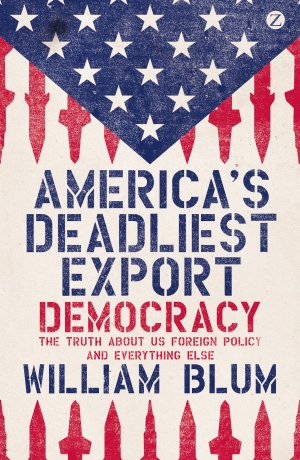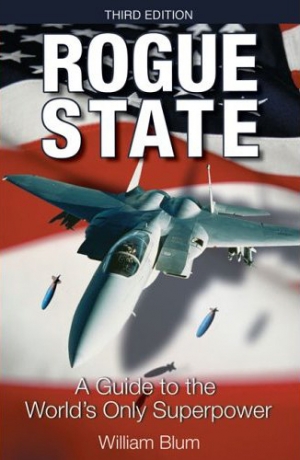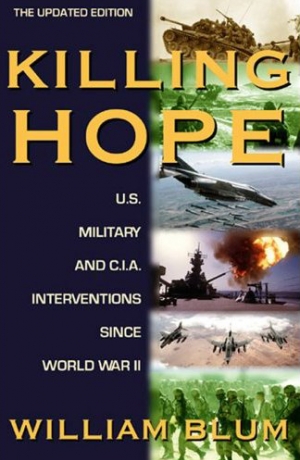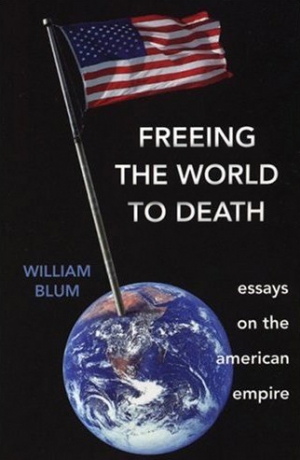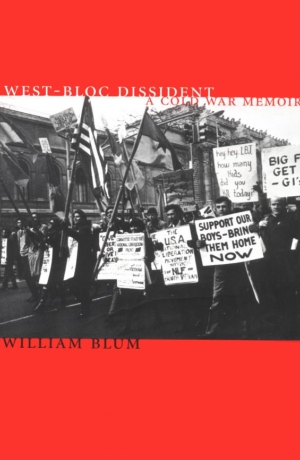The United States vs. Iraq—A Study in Hypocrisy
By William Blum
“We have heard that a half million children have died,” said “60 Minutes” reporter Lesley Stahl, speaking of US sanctions against Iraq. “I mean, that’s more children than died in Hiroshima. And – and you know, is the price worth it?”
Her guest, in May 1996, U.N. Ambassador Madeleine Albright, responded: “I think this is a very hard choice, but the price – we think the price is worth it.”
Today, Secretary of State Albright travels around the world to gather support for yet more bombing of Iraq. The price, apparently, is still worth it. The price is of course being paid solely by the Iraqi people – a million or so men, women and children, dead and a previously well-off nation plunged into poverty, disease, and malnutrition from the previous bombings and seven years of sanctions.
Their crime? They have a leader who refuses to cede all sovereignty to the United States (acting under its usual United Nations cover) which demands that every structure in Iraq, including the presidential palaces, be available for inspection for “weapons of mass destruction”. After more than six years of these inspections, and significant destruction of stocks of forbidden chemical, biological, and nuclear weapon material, as well as weapons research and development programs, the UN team still refuses to certify that Iraq is clean enough.
Inasmuch as the country is larger than California, it’s understandable that the inspectors can not be certain that all prohibited weapons have been uncovered. It’s equally understandable that Iraq claims that the United States can, and will, continue to find some excuse not to give Iraq the certification needed to end the sanctions. Indeed, President Clinton has said more than once that the U.S. will not allow sanctions to be lifted as long as Saddam Hussein remains in power. It can be said that the United States has inflicted more vindictive punishment and ostracism upon Iraq than upon Germany or Japan after World War 2.
The Saddam Hussein regime must wonder at the high (double) standard set by Washington. Less than a year ago, the U.S. Senate passed an act to implement the “Convention on the Prohibition of the Development, Production, Stockpiling and Use of Chemical Weapons and on Their Destruction” (Short title: Chemical Weapons Convention), an international treaty which has been ratified by more than 100 nations in its five-year life.
The Senate act, Section 307, stipulates that “the President may deny a request to inspect any facility in the United States in cases where the President determines that the inspection may pose a threat to the national security interests of the United States.” Saddam has asked for no more than that for Iraq. Presumably, under the Senate act, the White House, Pentagon, etc. would be off limits, as Saddam insists his presidential palaces should be, as well as the military unit responsible for his personal security, which an American colonel demanded to visit.
Section 303 further states that “Any objection by the President to an individual serving as an inspector … shall not be reviewable in any court.” Again, this echoes a repeated complaint from the Iraqis – a recent team of 16 inspectors included 14 from the US and Britain, Saddam’s two principal adversaries, who are, at this very moment, busily planning new bombing raids on Iraq. The team was led by a U.S. Marine Corps captain, a veteran of the Gulf War, who has been accused of spying by Iraq. But the Iraqis do not have a corresponding right of exclusion. The same section of the Senate act provides, moreover, that an FBI agent “accompanies each inspection team visit”.
The wishes of the Iraqi government to place certain sites off limits and to have less partisan inspectors have been dismissed out of hand by U.S. government spokespersons and the American media. “What do they have to hide?” has been the prevailing attitude.
The hypocrisy runs deeper yet. In his recent State of the Union address, President Clinton, in the context of Iraq, spoke of how we must “confront the new hazards of chemical and biological weapons, and the outlaw states, terrorists and organized criminals seeking to acquire them.” He castigated Saddam Hussein for “developing nuclear, chemical and biological weapons” and called for strengthening the Biological Weapons Convention. Who among his listeners knew, who among the media reported, that the United States had been the supplier to Iraq of much of the source biological materials Saddam’s scientists would require to create a biological warfare program?
According to a Senate Report of 1994 1 : From 1985, if not earlier, through 1989, a veritable witch’s brew of biological materials were exported to Iraq by private American suppliers pursuant to application and licensing by the U.S. Department of Commerce. Amongst these materials, which often produce slow and agonizing deaths, were:
- Bacillus Anthracis, cause of anthrax.
- Clostridium Botulinum, a source of botulinum toxin.
- Histoplasma Capsulatam, cause of a disease attacking lungs, brain, spinal cord and heart.
- Brucella Melitensis, a bacteria that can damage major organs.
- Clotsridium Perfringens, a highly toxic bacteria causing systemic illness.
- Clostridium tetani, highly toxigenic.
Also, Escherichia Coli; genetic materials; human and bacterial DNA.
Dozens of other pathogenic biological agents were shipped to Iraq during the 1980s. The Senate Report pointed out: “These biological materials were not attenuated or weakened and were capable of reproduction.”
“It was later learned,” the committee revealed, “that these microorganisms exported by the United States were identical to those the United Nations inspectors found and removed from the Iraqi biological warfare program.”
These exports continued to at least November 28, 1989 despite the fact that Iraq had been reported to be engaging in chemical warfare and possibly biological warfare against Iranians, Kurds, and Shiites since the early 80s.
During the Iraq-Iran war of 1980-88, the United States gave military aid and intelligence information to both sides, hoping that each would inflict severe damage on the other, in line perhaps with what Noam Chomsky has postulated:
It’s been a leading, driving doctrine of U.S. foreign policy since the 1940s that the vast and unparalleled energy resources of the Gulf region will be effectively dominated by the United States and its clients, and, crucially, that no independent, indigenous force will be permitted to have a substantial influence on the administration of oil production and price.
Indeed, there is evidence that Washington encouraged Iraq to attack Iran and ignite the war in the first place. This policy, as well as financial considerations, were likely the motivating forces behind providing Iraq with the biological materials. (Iran was at that time regarded as the greater threat to the seemingly always threatened U.S. national security.)
As the American public and media are being prepared to accept and cheerlead the next bombing of the people of Iraq, the stated rationale, the official party line, is that Iraq is an “outlaw” state (or “rogue” state, or “pariah” state – the media obediently repeats all the White House and State Department buzz words), which is ignoring a United Nations Security Council resolution. Israel, however, has ignored many such resolutions without the U.S. bombing Tel Aviv, imposing sanctions, or even cutting back military aid. But by some arcane ideological alchemy, Israel is not deemed an “outlaw” state by Washington. Neither does the United States regard itself as such for turning its back on a ruling of the U.N.’s World Court in 1984 to cease its hostile military actions against Nicaragua, or for the numerous times the U.S. has totally ignored overwhelming General Assembly resolutions, nor for its repeated use of chemical and biological agents against Cuba since the 1960s.
In any event, the weapons monitoring disagreement is between Iraq and the United Nations, not Iraq and the United States. And the UN has not authorized any of its members to use force. “What gives Britain and the United States the right to go it alone on this?” asked an unusually brave reporter at a Feb.6 Clinton/Blair press conference.
Neither President Clinton nor Prime Minister Blair responded.
The bombing looks to be inevitable. The boys are busy moving all their toys into position; they can already see the battle decorations hanging from their chests. Of course, no one knows what it will accomplish besides more death and destruction. Saddam will remain in power. He’ll be more stubborn than ever about the inspections. There may be one consolation for the Iraqi people. The Washington Post has reported that Secretary of Defense William Cohen has indicated that “U.S. officials remain wary of doing so much military damage to Iraq as to weaken its regional role as a counterweight to Iran.” In the not too distant future, when Iran begins to flex its muscles a bit more, in ways not to Washington’s pleasure, it may then be their turn for some good ol’ American “diplomacy”.
Notes
- U.S. Chemical and Biological Warfare-Related Dual Use Exports to Iraq and Their Possible Impact on the Health Consequences of the Persian Gulf War (May 25, 1994)
